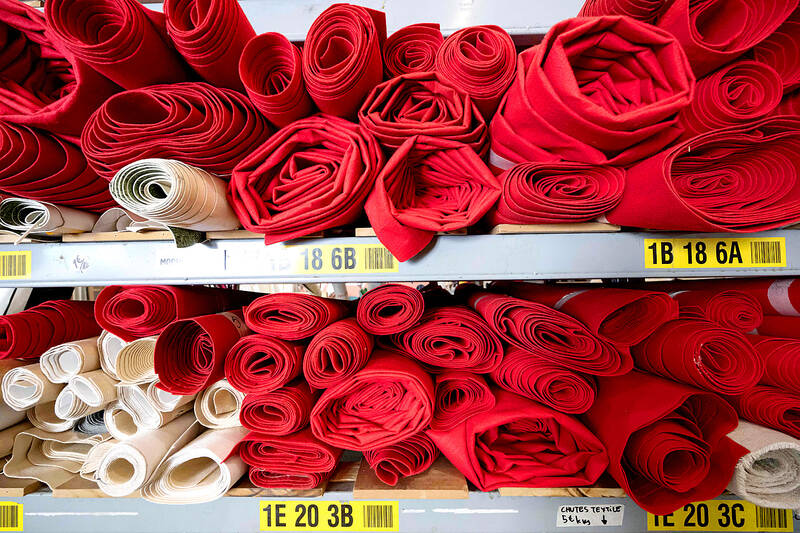After being walked on for two weeks by stars from Tom Cruise to Rihanna, the legendary red carpets of the Cannes Film Festival are set for a second life thanks to an upcycling charity and some environmentally conscious designers.
The red carpets were replaced daily at the festival, which ended on May 24, with organizers handing over 1.5 tonnes of fine red material to a non-profit organization in the port city of Marseille, France.
The carpets now sit on pallets or in black waste bags in a warehouse used by the La Reserve des Arts in the northern suburbs of Marseille where they are being sorted, cleaned and prepared for reuse.

Photo: AFP
Some of them have small holes — possibly a result of hosting all those towering stilettoes — while others have been marked by footsteps or scuffs.
“By reconditioning them, we’re helping to reduce the environmental impact of the event — something the festival is aware of,” La Reserve des Arts coordinator Jeanne Re told reporters during a visit on Wednesday.
The charity specialises in re-using or “upcycling” products used by the fashion, theater or other entertainment industries, finding new lives for items that might otherwise have ended up as waste.
The approach helps to reduce landfill and is seen as a response to growing public concern about the volume of single-use items used to put on public events. However, some environmental groups believe so-called second-life policies can result in “greenwashing,” leading organizers and companies to tout their recycling policies rather than focusing on reducing their overall consumption.
The Cannes carpet is being resold at just 1 euro a kilo, which amounted to 0.33 euro per square meter — an “unbeatable” price, Re said, adding that the goal was to make it “as accessible to as many of our members as possible.”
Elsa Ramouni-Yordikian, an artist and member who has been using the red carpets for the past four years, said she had used the material for handbags, bucket hats, glasses cases and even bags for wine bottles.
Some were “quite unique pieces,” she said of her work with the charity Les Nippones.
Ramouni-Yordikian recently showcased creations she made with last year’s carpet in an exhibition in Marseille titled “Dress Like a Movie Star.”
“The fact that it comes from a famous festival and is recycled locally — that makes sense to us,” she said.
Production of synthetic materials such as the red carpets would “never stop, there will always be more, just like festivals and trade shows, so we need to find ways to give them new value,” Ramouni-Yordikian said.
The top prize for best film at this year’s Cannes Festival went to dissident Iranian filmmaker Jafar Panahi for his highly political movie It Was Just an Accident.

SMART MANUFACTURING: The company aims to have its production close to the market end, but attracting investment is still a challenge, the firm’s president said Delta Electronics Inc (台達電) yesterday said its long-term global production plan would stay unchanged amid geopolitical and tariff policy uncertainties, citing its diversified global deployment. With operations in Taiwan, Thailand, China, India, Europe and the US, Delta follows a “produce at the market end” strategy and bases its production on customer demand, with major site plans unchanged, Delta president Simon Chang (張訓海) said on the sidelines of a company event yesterday. Thailand would remain Delta’s second headquarters, as stated in its first-quarter earnings conference, with its plant there adopting a full smart manufacturing system, Chang said. Thailand is the firm’s second-largest overseas

‘REMARKABLE SHOWING’: The economy likely grew 5 percent in the first half of the year, although it would likely taper off significantly, TIER economist Gordon Sun said The Taiwan Institute of Economic Research (TIER) yesterday raised Taiwan’s GDP growth forecast for this year to 3.02 percent, citing robust export-driven expansion in the first half that is likely to give way to a notable slowdown later in the year as the front-loading of global shipments fades. The revised projection marks an upward adjustment of 0.11 percentage points from April’s estimate, driven by a surge in exports and corporate inventory buildup ahead of possible US tariff hikes, TIER economist Gordon Sun (孫明德) told a news conference in Taipei. Taiwan’s economy likely grew more than 5 percent in the first six months

The seizure of one of the largest known mercury shipments in history, moving from mines in Mexico to illegal Amazon gold mining zones, exposes the wide use of the toxic metal in the rainforest, according to authorities. Peru’s customs agency, SUNAT, found 4 tonnes of illegal mercury in Lima’s port district of Callao, according to a report by the non-profit Environmental Investigations Agency (EIA). “This SUNAT intervention has prevented this chemical from having a serious impact on people’s health and the environment, as can be seen in several areas of the country devastated by the illegal use of mercury and illicit activities,”

DIVERSIFYING: Taiwanese investors are reassessing their preference for US dollar assets and moving toward Europe amid a global shift away from the greenback Taiwanese investors are reassessing their long-held preference for US-dollar assets, shifting their bets to Europe in the latest move by global investors away from the greenback. Taiwanese funds holding European assets have seen an influx of investments recently, pushing their combined value to NT$13.7 billion (US$461 million) as of the end of last month, the highest since 2019, according to data compiled by Bloomberg. Over the first half of this year, Taiwanese investors have also poured NT$14.1 billion into Europe-focused funds based overseas, bringing total assets up to NT$134.8 billion, according to data from the Securities Investment Trust and Consulting Association (SITCA),